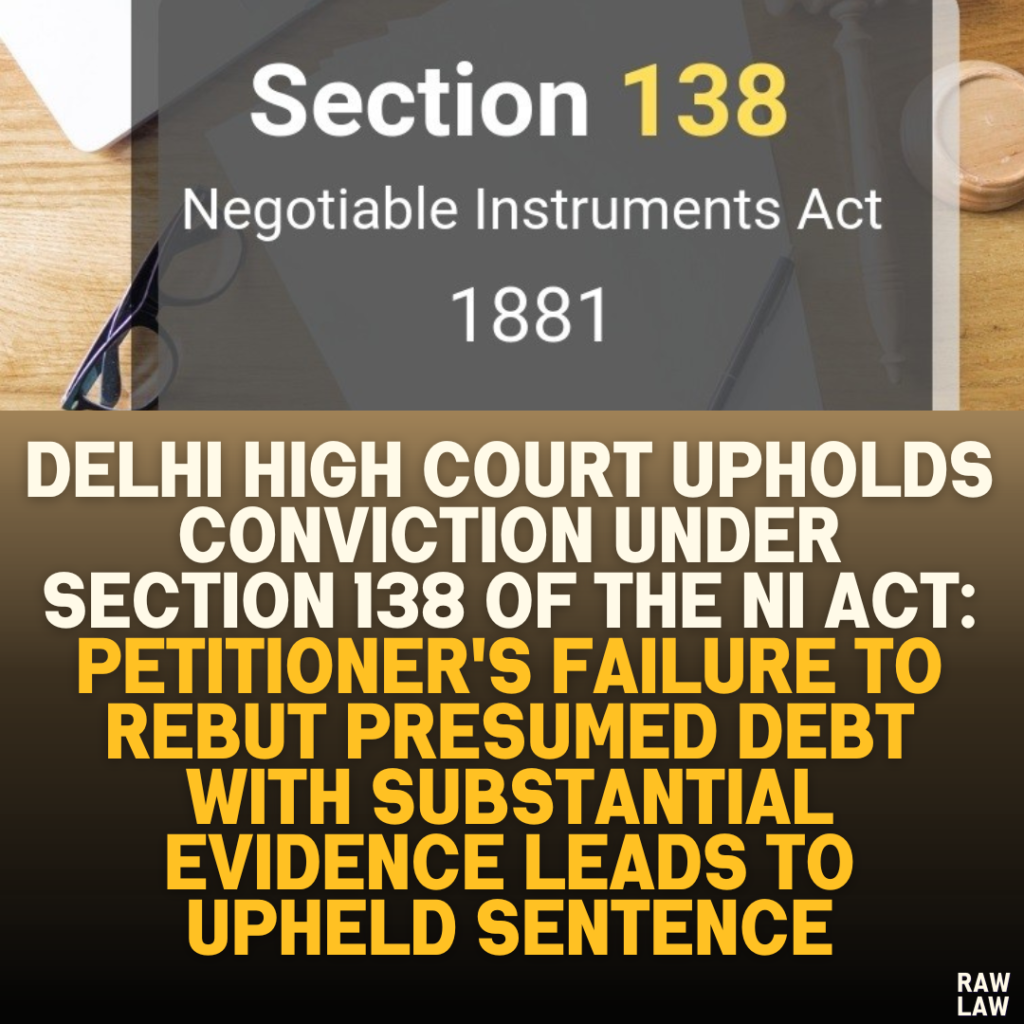Court’s Decision
The Delhi High Court dismissed the revision petition challenging the lower courts’ concurrent findings of guilt under Section 138 of the Negotiable Instruments Act, 1881 (NI Act), reinforcing that the petitioner failed to provide sufficient evidence to rebut the statutory presumption of debt associated with issued cheques.
Facts
The petitioner was convicted by the Metropolitan Magistrate (MM) based on a complaint under Section 138 of the NI Act. The complainant claimed the petitioner borrowed ₹1,50,000 as a friendly loan, issuing two cheques to discharge this liability. When presented, these cheques were dishonored due to insufficient funds. Following a legal demand notice, which was not complied with, the complainant pursued legal action under the NI Act. The MM convicted the petitioner, sentencing him to imprisonment until the rising of the Court and ordering compensation of ₹2,00,000 to the complainant, with an additional penalty of simple imprisonment in case of non-payment.
Issues
- Whether the petitioner could rebut the presumption of a legally enforceable debt associated with the cheques issued.
- Whether the petitioner provided credible evidence to support his claims regarding the origin and purpose of the cheques.
Petitioner’s Arguments
The petitioner contended that:
- He had no knowledge of the complainant and had not engaged in any transaction with them.
- The cheques were given as blank signed securities to one Vinod Tiwari for a different loan transaction, and the complainant misused these cheques.
- He did not receive the legal notice from the complainant demanding repayment.
Respondent’s Arguments
The respondent maintained that:
- The conviction was appropriate as the petitioner failed to rebut the presumption of debt under Section 139 of the NI Act.
- The petitioner did not provide any evidence to support his defense or undermine the complainant’s evidence.
Analysis of the Law
The Court highlighted that under Sections 118 and 139 of the NI Act, a presumption exists that the cheque is issued for a legally enforceable debt. Once the petitioner admitted to signing the cheques, this presumption automatically favored the complainant, shifting the burden to the petitioner to disprove this debt through credible evidence. The Court relied on established principles, emphasizing that merely asserting innocence without corroborating evidence is insufficient to counter statutory presumptions.
Precedent Analysis
The Court referred to Rajesh Jain v. Ajay Singh (2023) and Bir Singh v. Mukesh Kumar (2019), affirming that the presumption under the NI Act places an evidential burden on the accused to show no enforceable debt existed. Moreover, the Supreme Court’s guidance on statutory presumptions highlights the necessity of substantial evidence to counter presumptive debt arising from an issued cheque.
Court’s Reasoning
The Court found that the petitioner’s arguments were unsupported by any substantial evidence:
- The petitioner failed to produce receipts for the alleged repayment to Vinod Tiwari.
- He neither filed a police complaint against Vinod Tiwari nor initiated any legal action regarding the alleged misuse of his cheques.
- The petitioner did not summon witnesses or provide direct or circumstantial evidence to corroborate his claim that the cheques were provided for a different transaction unrelated to the complainant.
Conclusion
The Court concluded that the petitioner’s lack of substantive evidence to rebut the presumption of debt mandated by Sections 118 and 139 of the NI Act warranted upholding the conviction and sentence. The Court stated that its role in revisionary jurisdiction does not extend to re-evaluation of evidence unless a glaring error is apparent, which was not the case here.
Implications
This decision underscores the importance of the statutory presumption in favor of the cheque holder in cases under Section 138 of the NI Act. Defendants must produce concrete evidence to rebut presumptions, as bare assertions without material support are insufficient to dislodge statutory liabilities. The case reaffirms judicial restraint in revisionary proceedings where concurrent factual findings support the conviction.



